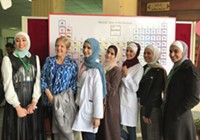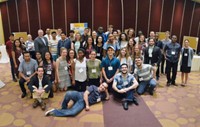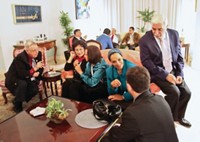Advertisement
Grab your lab coat. Let's get started
Welcome!
Welcome!
Create an account below to get 6 C&EN articles per month, receive newsletters and more - all free.
It seems this is your first time logging in online. Please enter the following information to continue.
As an ACS member you automatically get access to this site. All we need is few more details to create your reading experience.
Not you? Sign in with a different account.
Not you? Sign in with a different account.
ERROR 1
ERROR 1
ERROR 2
ERROR 2
ERROR 2
ERROR 2
ERROR 2
Password and Confirm password must match.
If you have an ACS member number, please enter it here so we can link this account to your membership. (optional)
ERROR 2
ACS values your privacy. By submitting your information, you are gaining access to C&EN and subscribing to our weekly newsletter. We use the information you provide to make your reading experience better, and we will never sell your data to third party members.
Careers
Eurasia-11
Behind the scenes with Amal Al-Aboudi
by A. Maureen Rouhi
November 15, 2010
| A version of this story appeared in
Volume 88, Issue 46

At the 11th Eurasia Conference on Chemical Sciences, held last month in Jordan, the program consisted of not only plenary lectures, oral presentations, and poster sessions, but also panel discussions, workshops, and cultural activities. Add daily transportation for some attendees from Amman to the Dead Sea, catering, and coffee service for more than 600 people, and one can imagine the enormity of the task before the national organizers, who did not have prior experience in staging a conference of this size and stature.


By most accounts, Eurasia-11 was a smashing success. The organizers pulled off the complicated logistics and achieved their most important goals: proving that Jordan is an apt venue for international scientific gatherings and offering talented young chemists of the region an opportunity to see chemistry beyond their national boundaries.
"It was a challenge for me and for our department," Amal Al-Aboudi told C&EN. The University of Jordan chemistry professor was also the conference's secretary general, working closely with Musa Nazer and Musa Abu Zarqa, the chairs of the national organizing and the scientific committees, in planning and executing the meeting. "We wanted to show our guests from all over the world that we have the capability here in Jordan to organize conferences such as those of IUPAC and the Federation of Asian Chemical Societies. Their conferences are even bigger than Eurasia. We invited representatives of these associations. They were much impressed with the preparations for Eurasia-11, and we hope in the future they will consider Jordan for their conferences."
For many attendees, Al-Aboudi was the ebullient face of the conference. She was at Amman's international airport to meet foreign participants. She circulated the convention center with phone in hand, addressing problems, making sure everything was all right, chatting with groups of students, and then engaging a Nobel Laureate on the topic of scientists' ethical responsibilities. But she was also quick to emphasize the teamwork behind the meeting's success.
For three years, Nazer and Al-Aboudi had been working closely, meeting daily to plan all aspects of the conference, from fund-raising to the media campaign, Al-Aboudi explained. Nazer, renowned nationally as the father of Jordanian chemistry, "helped a lot. Everybody listens to him. He could get appointments with people of authority," and the high esteem people held for him facilitated many actions, she said. And other colleagues were working day and night until the early morning, even during the month of Ramadan, reviewing abstracts, she added. "Maybe you see me running here and there, but all of us were sharing the work."
Meanwhile, members of the international organizing committee—including Ivano Bertini and Bernd Michael Rode, two of the three founding organizers of the Eurasia conference series—assisted by recommending invitees, publicizing the meeting in their countries, and most critically, suggesting funding agencies that could be provide financial support, Al-Aboudi explained.
For Al-Aboudi, the five hectic days of Oct. 6–10 at the King Hussein Bin Talal Convention Center, by the Dead Sea, fulfilled an eight-year dream that began when she attended the 7th Eurasia conference, in 2002, in Karachi, Pakistan. There, she met the three Eurasia conference series founders—Bertini, Rode, and the late Hitoshi Ohtaki. "Ohtaki told me the main objective of Eurasia, which is to help young talented chemists and graduate students in developing countries by organizing such a conference in their own countries so that they can be exposed to the future area of sciences," Al-Aboudi recalled. "I found it to be a noble cause, and when I came back and discussed it with the chemistry department, I got a lot of support." In the following years, Al-Aboudi built the case for holding the conference in Jordan and presented it at various venues, and in 2006, Jordan got the green light for 2010 meeting.
Lacking any experience in organizing international meetings when she and her colleagues began planning, Al-Aboudi has learned a lot from the process. "First, I'm better at fund-raising," she said, laughing. "With the help of many international and national friends," she said, "we raised enough money" to pay for the costs of invited speakers and to support the participation of students from all over Jordan and even from overseas.
"To achieve the goal of Eurasia, you have to be able to support students because it is they whom we want here, and they don't have funds," Al-Aboudi said. Most of the students who applied to attend got some support, such as accommodation, transportation, or registration waiver. In the beginning, she said, she found it difficult to ask for money, but eventually she felt "stronger, because I'm not asking money for the university or my research; I'm asking money for others to be supported."
Al-Aboudi is passionate about opening doors such as Eurasia-11 for young scientists. "I like them to be exposed to other ideas, to think openly," she told C&EN. She encourages her students to attend lectures of eminent chemists whenever the opportunity arises, because "you never know when you will be inspired." She remembers attending in the 1980s a lecture of Jon Clardy, who is now with Harvard Medical School, about proteins and enzyme modeling. "I did not understand everything he said at that time," she said, but the lecture was for her an Aha! moment, introducing her to a topic that she wanted to learn about and that is now a focus of her independent research.
As did many attendees, Al-Aboudi said Eurasia-11 exceeded her expectations. The Jordanian students, especially, have been energized: "They want to listen to the [recorded] lectures again, to read about the scientists they met, and they want to work on improving their English-language skills, as well," she said. Building on the momentum of Eurasia-11, she continued, "we are now preparing activities for the International Year of Chemistry."





Join the conversation
Contact the reporter
Submit a Letter to the Editor for publication
Engage with us on Twitter